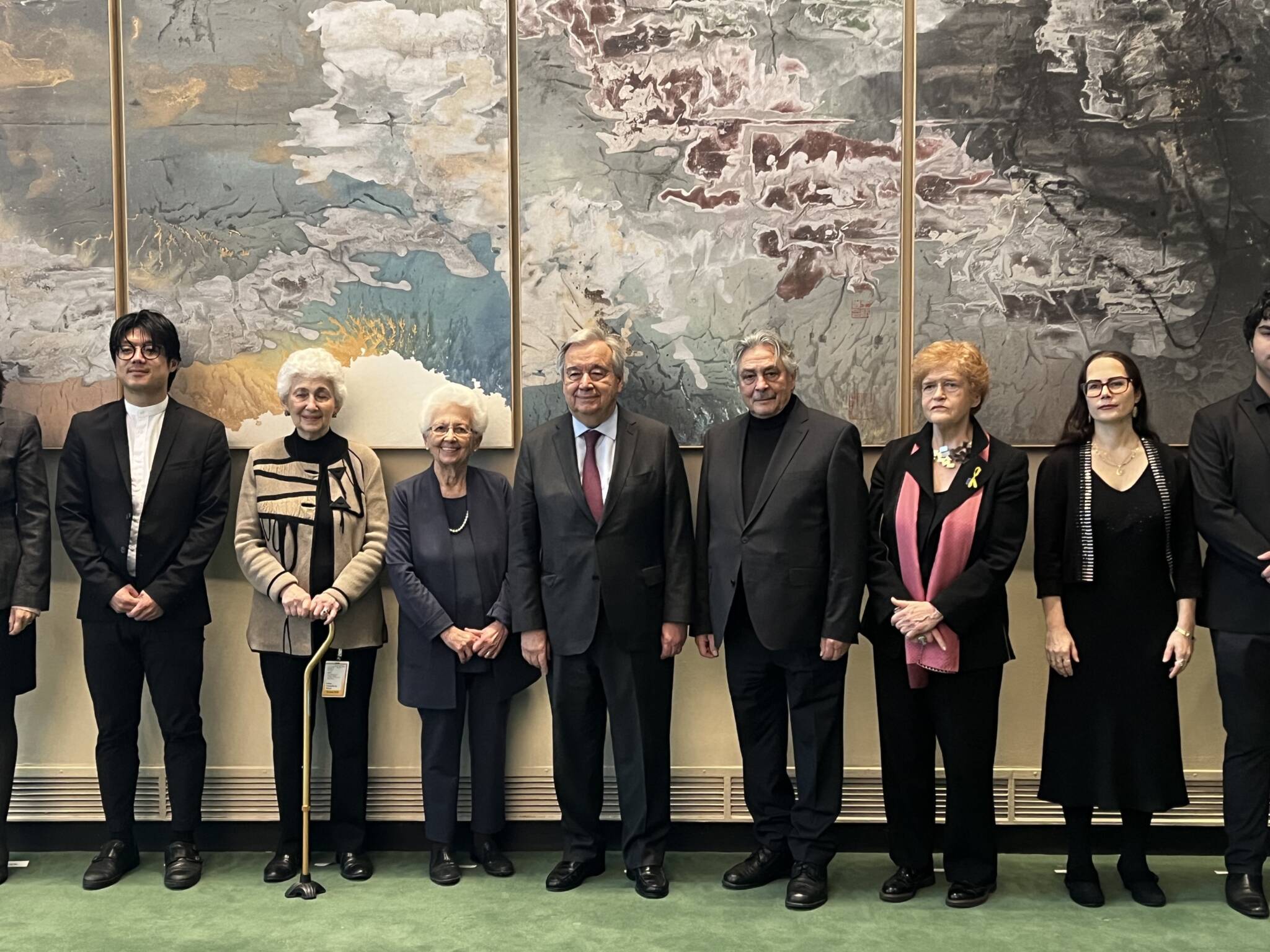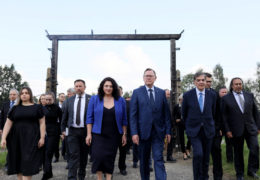
On January 26, Christian Pfeil gave a commemorative speech on behalf of the surviving Sinti and Roma at the United Nations’ central commemoration ceremony to mark International Holocaust Remembrance Day. The Central Council had campaigned for his invitation and Christian Pfeil is only the second member of the minority to be allowed to speak at the UN. A video of the entire event is available online. The Central Council documents Christian’s speech here. The spoken word prevails:
“Dear Mr. Secretary General,
Dear World Community, Excellencies,
Ladies and gentlemen,
“Ma schve und schale Latscho Dives” is the greeting in Romani, the language of the Sinti and Roma.
I am very moved that I am able to address the United Nations today on the International Day of Commemoration in memory of the victims of the Holocaust as a survivor and representative of Sinti and Roma. This is an important sign of international recognition of the “forgotten Holocaust” of the Sinti and Roma, which was ignored and denied for decades and is still far too little anchored in the consciousness of our societies today.
Today we commemorate the persecuted, murdered and survivors of the Holocaust, the 500,000 murdered Sinti and Roma and the 6 million murdered Jews in Nazi-occupied Europe. The Holocaust was the culmination of centuries of antigypsyism and antisemitism in Germany and Europe, an industrial murder of people solely on the basis of their origin, which was meticulously implemented by the entire state bureaucracy.
Ladies and gentlemen,
I am a Holocaust survivor and Sinti from Germany. Back in May 1940, my entire family was deported from our hometown of Trier to the camps in German-occupied Poland simply because they were Sinti. My eldest sister Berta was 12 when she was deported to the camps and my youngest brother Ludwig was just 3 years old. My siblings told me that all the children – even the very young ones – had to do hard forced labor in the camps, such as building roads and digging trenches. There was almost nothing to eat, potato peelings were a feast. Whenever there was dry bread – and it was very dry – it was shared out among us. We suffered from great hunger throughout the years and the fear of freezing to death or being murdered.
I myself was born in the Lublin ghetto in the beginning of 1944. My mother had to take me to work wrapped in a piece of cloth and lay me next to her in the snow during the winter months. It was a miracle that I and my immediate family survived. When asked how this was possible after five and a half years in camp, my parents said:
“O Baro Deve un i Debski Dai his pas mende.”
God and the Mother of God were with us.
However, many of my close relatives did not survive the Holocaust.
Many were gassed and murdered in Auschwitz.
Ladies and gentlemen,
However, the end of the war did not mean the end of exclusion, humiliation and persecution for us Sinti and Roma. In the state authorities of the Federal Republic of Germany, perpetrators who were responsible for the deportation and persecution of our families during the Nazi era took the decisions about our compensation claims. Antigypsyism continued uninterrupted in Germany and Europe and led to racist exclusion, indeed a form of apartheid, against the largest minority in many European countries.
It was only thanks to the courageous civil rights movement of Sinti and Roma, including many Holocaust survivors but also subsequent generations, that our minority was able to fight for recognition of the Nazi crimes and recognition as a national minority in the 1970s and 1980s. It took four decades until the then German Chancellor Helmut Schmidt recognized the genocide of Sinti and Roma under international law in 1982. In 2022, the German Federal President Frank-Walter Steinmeier described this antigypsyism and the continued injustice against Sinti and Roma after 1945 as a “second persecution” and asked Sinti and Roma for forgiveness.
Ladies and gentlemen,
It fills me with great concern when I see the rise of nationalism and right-wing extremism in the world today. My family and I have had to experience what racist hatred and violence can lead to. I myself experienced two right-wing extremist attacks on my person and my business in the 1990s. The legacy of the victims of Auschwitz is an obligation and responsibility for all nations and for the global community gathered here. It is not just about protecting minorities such as Sinti and Roma and Jews, it is about the fact that today – more than ever – we must defend our democracy and the rule of law.
Ladies and gentlemen,
Every year on August 2, we commemorate the last 4,300 Sinti and Roma in the German Nazi concentration camp Auschwitz-Birkenau, who were murdered by the SS on this night in 1944 despite fierce resistance. In 2015, the European Parliament declared this day International Holocaust Memorial Day for Sinti and Roma. I appeal to all member states of the United Nations to recognize August 2 as International Holocaust Memorial Day for Sinti and Roma and to commemorate this year’s 80th anniversary at the Auschwitz-Birkenau Memorial in a dignified manner.
I would like to call on young people around the world in particular to carry the memories of us eye- witnesses and the remembrance into the future. I hope that you will stand up for democracy and against antigypsyism, antisemitism and all forms of racism with courage and commitment.
Thank you very much”

